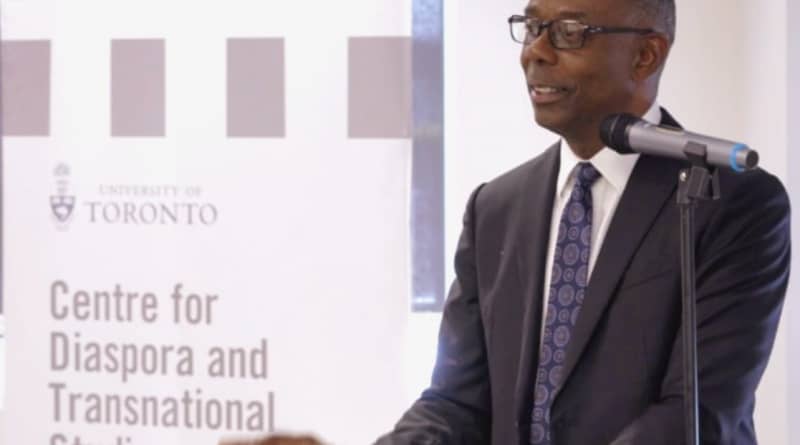
REAL NEWS: Harold Lovell, former political leader of the United Progressive Party (UPP), says his just-concluded visit to Toronto, Canada, was mentally stimulating, as it afforded him the opportunity for both academic and socio-political discourse.
Lovell was invited by the University of Toronto to present a lecture, “Democratic Politics: Legacies & Critical Reflections in Antigua and Barbuda, the Caribbean Rim and Beyond,” last Thursday, May 11.
At the outset, however, Lovell told his audience, which included doctoral students, that he would be inserting the word “contradictions,” so that he could look “not only at the challenges but also the contradictions of democratic politics.”
He explained his use of the term “democratic politics” as a reference to the British Westminster system of government.
This system, he said, “has been adopted but has hardly been adapted to our needs and in our image and likeness.
“It was taken from the green hills, vales and valleys of England and transplanted to the cane fields and the sun-lit beaches of the Caribbean. In doing so, we have inherited all the contradictions which make sense to the British but which seem to defy common sense and logic.”
Among the contradictions, Lovell said, is “our bi-cameral legislature, taken lock, stock and barrel, a mirror image of the House of Lords and the House of Commons.”
He notes that, in theory, “the Senate is the Upper House; but in reality, in the ranking of power and influence, the Senate is really the Lower House.”

Speaking to the doctrine of separation of powers, Lovell, a former minister of government, asked: “What kind of separation can there really be in our small legislative chambers when more than half the House of Representatives sits in the Cabinet as the Executive Branch of government?”
And as far as the authority ascribed to the head of State, Lovell said it could be considered a “constitutional fiction,” given the absence of real power.
He also noted the glaring contradiction of “an electoral system where one party can get 45 percent of the popular vote and end up with 100 percent of the political power.”
In his nearly hour-long presentation, Lovell traced the socio-political trajectory of Antigua and Barbuda, including the inherited norms of colonialism; the rise of the unions, including the Teachers Struggle; the the challenges of media liberalization, with Observer Media as his example; and the perversion of democracy.
Within the lecture, he used examples from other Caribbean countries – in particular, the Grenada Revolution led by the late Maurice Bishop – and quoted generously from regional academics.
In short, Lovell concluded that the Westminster system “has outlived its usefulness and what is required is continued social reckoning to address the challenges and contradictions of this system.”
Speaking with REAL News since his return, he reports that “the lecture was quite comprehensive; a great deal of research went into it, and, eventually, I’ll be developing it into a book.”
A review of the presentation, from a foreign student, was particularly gratifying, he says, and he shares the comments, which describe the event as an “inspiring intervention” and “the best lecture” the young man had heard in his five months in Canada.
Meanwhile, on Saturday, Lovell met, more informally, with Antiguans and Barbudans living in the Toronto area.
In what, he tells our Newsroom, was a “very interactive” session, Lovell says he spoke on the issues currently challenging Antigua and Barbuda – starting with the costly and lengthy process of obtaining a Canadian visa.
He notes that, in his case, he had to travel to and from the Canadian Embassy in Trinidad via New York, and, owing to the limited travel options, spend a week in the Southern Caribbean country.
Together, Lovell says, he and the audience looked at other quality-of-life problems – including the water shortage, poor garbage collection, and rising crime – and then the regional and international implications of the Antigua Airways debacle and the smuggling of West African migrants into other territories.
In the recent election campaign, Lovell and the UPP worked closely with the Diaspora Progressives with the stated intentions of deepening the relationship between nationals at home and abroad and involving the Diaspora in the country’s decision-making.
Accordingly, Lovell says he is extremely grateful for the group’s continued involvement and its invitation to Canada. Instrumental in the invitation to present at the university and to meet with the nationals abroad, he says, was Akil Jabari, who describes himself as “a proud Ovals man.”
Lovell also extends his gratitude to the University of Toronto and the faculty members who hosted and participated in the lecture.
Advertise with the mоѕt vіѕіtеd nеwѕ ѕіtе іn Antigua!
We offer fully customizable and flexible digital marketing packages.
Contact us at [email protected]
















No room in the inn for CA-CAPA-TI-TAH and MASKSES??
How much longer will “shield” aka undermine DEAD DARG PICK-UP-CORN PRINGLE???? He not “worthy”???
Larz JAMMARL PRINGLE is the Leader not true???
Harold Lovell is still the invisible leader 😀😀😀
Ok sick puppy!
You had the stage for yourself.
You posted 11:51 am, 11:52 am, and
4:32 pm.
You are still an idiot.
Are you in love with Harold?
Comments are closed.